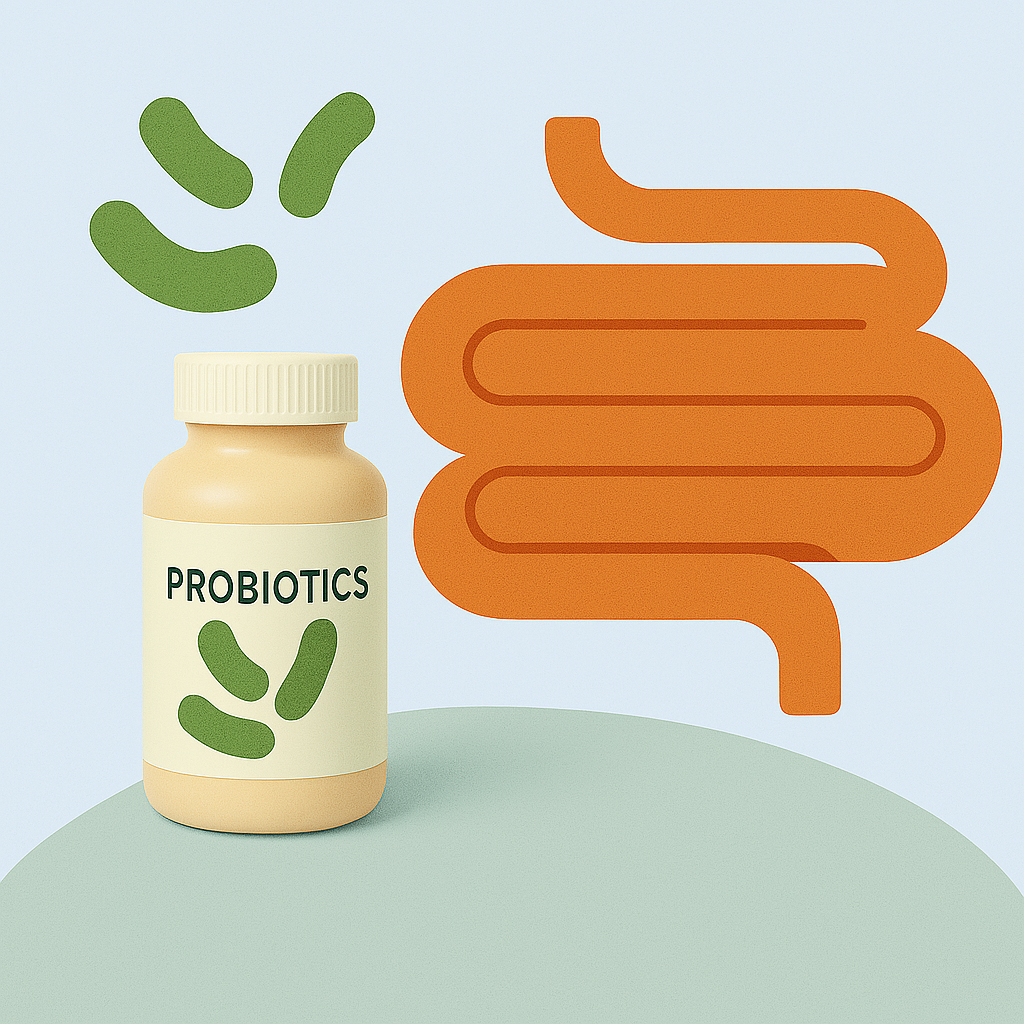Probiotics — live microorganisms widely believed to confer health benefits have attracted growing attention among scientists and the general public. Their potential role in digestive health is especially intriguing. As people seek ways to improve well-being through diet and lifestyle, probiotics have emerged as a promising option for supporting gastrointestinal (GI) function. Still, it is vital to examine the scientific evidence behind the claim that probiotics help with digestion. This paper explores the mechanisms by which probiotics may improve digestive function, evaluates pertinent studies, and offers an inspirational viewpoint on using these microorganisms for digestive support.
Mechanisms of Probiotic Action
Probiotics act primarily within the gut microbiome, a vast community of microorganisms in the human digestive tract. A balanced microbiome is crucial for nutrient absorption, immune function, and inflammation control. When this equilibrium is disturbed — a condition called dysbiosis — unfavorable bacteria can proliferate, leading to diarrhea, bloating, or constipation. Probiotics, by definition, aim to restore balance and reduce such digestive issues.
One key way probiotics may aid digestion is by enhancing the breakdown and absorption of nutrients. Certain strains, such as Lactobacillus and Bifidobacterium, produce enzymes that help digest proteins, carbohydrates, and fats. Some also generate short-chain fatty acids, which nourish intestinal cells and foster an optimal gut environment. These actions help maintain a robust intestinal lining, potentially minimizing discomfort and promoting efficient digestion.
Probiotics can also support the gut barrier, the epithelial layer in the intestines that blocks harmful substances from entering the bloodstream. A healthy barrier shields against pathogens and toxins. Furthermore, probiotics may modulate immune responses in the gut, encouraging beneficial reactions while curbing excessive inflammation. These immunoregulatory effects contribute to more stable, less reactive GI function.
Scientific Evidence on Probiotics and Digestion
A growing body of research indicates that probiotics can positively affect digestion. A prime example involves antibiotic-associated diarrhea. Antibiotics disrupt normal gut flora, allowing pathogens like Clostridioides difficile to thrive. Multiple randomized controlled trials have shown that supplementing with specific probiotic strains, notably Lactobacillus rhamnosus GG and Saccharomyces boulardii, lowers the incidence and duration of this type of diarrhea.
Beyond antibiotic-associated diarrhea, probiotics have been studied for managing other conditions linked to digestive symptoms, such as irritable bowel syndrome (IBS). Although IBS has various causes, a disturbed microbiome is often implicated. Some studies suggest that particular probiotic strains mitigate bloating and abdominal pain in IBS patients. For instance, Bifidobacterium infantis 35624 has demonstrated promise. While data are somewhat mixed, the evidence remains encouraging.
Probiotics may also encourage regular bowel movements, a benefit for individuals coping with constipation. By supporting balanced flora, they can improve gut motility and bolster more consistent evacuation. This effect may stem partly from increased short-chain fatty acid production, which affects the intestinal muscles.
Challenges and Considerations
Despite their potential, probiotics face challenges in clinical application. First, strains differ widely in their effects. Lactobacillus acidophilus can function in distinct ways compared to Bifidobacterium lactis. Effective doses may also vary across strains. Additionally, personal factors such as diet, environment, stress, and genetics can influence results. Consequently, a probiotic that succeeds for one individual may not yield the same outcomes for another.
Quality is another key consideration. Probiotics are living organisms, vulnerable to heat, moisture, and other factors that affect their survival. Proper storage is essential for preserving viability. Fermented foods, while beneficial, can vary in bacterial counts, making it harder to quantify exact doses.
Given these complexities, many people prefer to combine probiotics with other natural supplements, enhancing overall digestive wellness and maximizing beneficial effects through a broader, holistic nutritional strategy.
Inspiring a Holistic Perspective
Although research underscores probiotics’ benefits, a balanced perspective is essential. The complex bacterial communities in our intestines mean that no single strain can universally solve digestive problems. Moreover, dietary habits, sleep quality, stress management, and exercise all influence gut health. Probiotics often work best as part of a holistic approach.
Nonetheless, the potential of probiotics remains profoundly inspiring, highlighting the synergy between humans and microbes. Rather than viewing bacteria merely as threats, we increasingly recognize their pivotal role in digestion, immunity, and overall vitality. Embracing probiotics through both supplements and probiotic-rich foods — like yogurt, kefir, kimchi, and sauerkraut — can integrate these helpful microbes into daily life.
Geberich Digestive Health Supplements
Geberich offers a range of digestive health supplements designed to support a balanced gut environment. While each product is grounded in the latest findings on beneficial bacteria, Geberich™’s overall catalogue embraces a core philosophy: high-quality ingredients, safe manufacturing practices, and a holistic appreciation of digestive health.
These supplements can be a convenient option for people who prefer a measured daily dose of probiotics or who have specific dietary considerations. Geberich places emphasis on ensuring product stability and viability so that customers can trust the supplements they include in their routine. Though individual responses will vary, Geberich’s digestive health line aims to meet a range of needs, from everyday support to heightened periods of gastrointestinal strain (for example, while traveling or when under greater stress).
By offering a variety of strengths and formulations, Geberich seeks to accommodate those who are entirely new to probiotics, as well as individuals already familiar with the benefits of incorporating beneficial microbes into their healthcare regime. The overarching goal is to help people make informed choices about how to best nurture their digestive systems in accordance with their personal habits and lifestyles.
Looking Ahead
Probiotic research continues to advance, fueling hope that we can harness the microbiome to promote health from within. While probiotics are not a universal remedy, they are a valuable tool within an expanding arsenal of dietary and lifestyle interventions. Demonstrated benefits in antibiotic-associated diarrhea and possible advantages in IBS reflect their therapeutic promise. As scientific methods refine, researchers will likely discover more precisely how specific strains interact with the human body, leading to targeted and more effective probiotic treatments.
Moreover, scientists are increasingly investigating how probiotics may work in synergy with prebiotics — nutrients that feed beneficial bacteria. This emerging field, often called synbiotics, shows potential in improving the stability and resilience of gut flora. As we learn more about these complementary strategies, individuals may benefit from innovative, personalized approaches to digestive support.
Probiotics offer a promising means of enhancing digestion. Though individual results differ, many studies suggest they help maintain balanced gut flora, fine-tune immune responses, and foster smoother digestive function. Whether administered as supplements or consumed in fermented foods, probiotics can form an integral part of a proactive approach to digestive wellness. Their growing popularity exemplifies the remarkable partnership between humans and microorganisms, motivating us to keep exploring natural avenues for strong health. By adopting probiotics mindfully — considering personal circumstances, strain distinctions, and overall lifestyle — individuals can cultivate a more resilient digestive system, lighting the way toward renewed vitality and a greater sense of well-being.
References
-
Hempel S, Newberry SJ, Maher AR, et al.
Probiotics for the prevention and treatment of antibiotic-associated diarrhea: a systematic review and meta-analysis.
JAMA. 2012;307(18):1959–1969.
PubMed Abstract -
Moayyedi P, Ford AC, Talley NJ, et al.
The efficacy of probiotics in the treatment of irritable bowel syndrome: a systematic review.
Gut. 2010;59(3):325–332.
Full Text (Open Access may vary) -
Slavin J.
Fiber and prebiotics: mechanisms and health benefits.
Nutrients. 2013;5(4):1417–1435.
Full Text (Open Access) -
The International Scientific Association for Probiotics and Prebiotics (ISAPP).
ISAPP Website (contains links to additional scientific publications)





